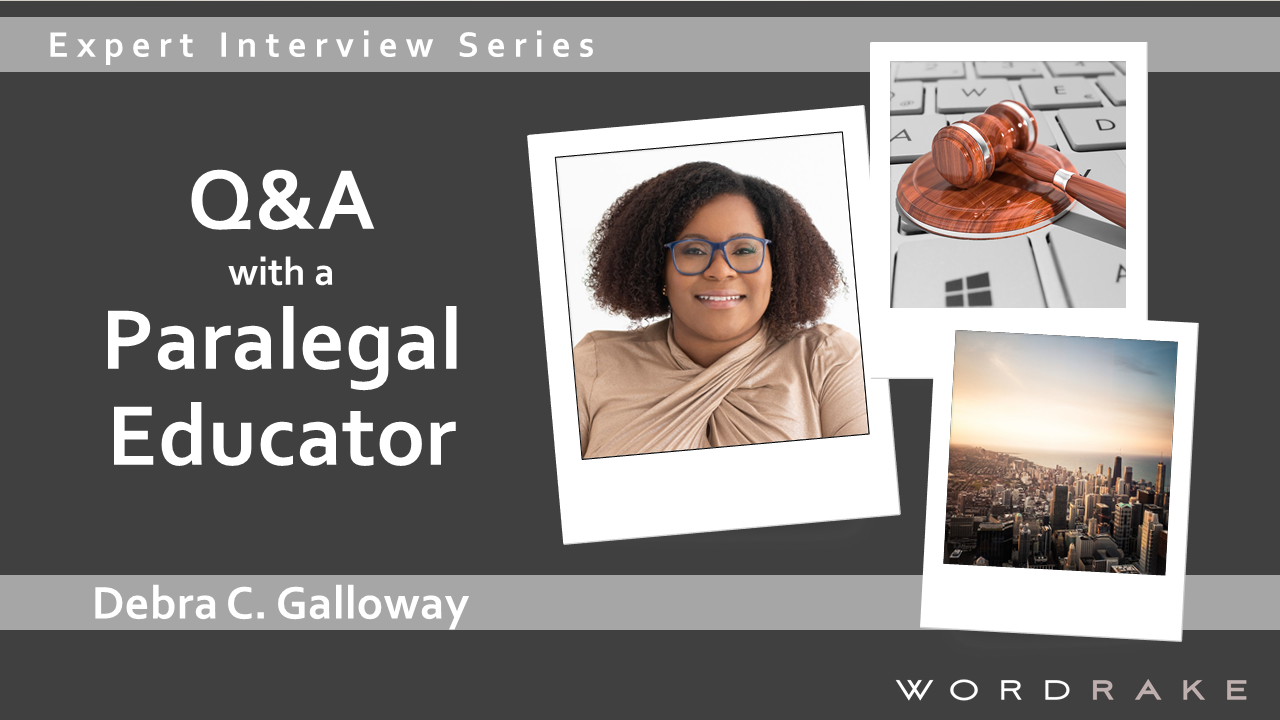“Paralegals hold a significant and invaluable position, offering skills and performing job duties that are indispensable,” says paralegal educator Debra C. Galloway. Seeing the value that paralegals bring to legal work, Debra was called to teach paralegals. She has been a paralegal educator at Midlands Technical College for seven years.
In this moving interview, Debra explains what paralegals learn in her paralegal program at Midlands and the importance of working with your paralegal as a team. She also shares her deep insights on the technical and professional skills paralegals must possess to contribute the most to the legal service team. Read on to learn how Debra combines her 18 years of legal practice experience, love for the law, and passion for education in her role.
What is your role and how did you get to where you are today?
Law is a calling, not just a job. It is meaningful work. I get the privilege of helping people navigate through the legal system and I get the privilege of training paralegals to assist other lawyers in doing the same.
I’ve always known that “law” was where I wanted to be. I also knew I wanted to share what I know about the law with others. That’s why, in addition to practicing law, I teach paralegals how to assist lawyers in their practice. The paralegal program at Midlands Technical College allows me to combine my two loves: teaching and law.
I’m fortunate to have spent my entire paralegal teaching career in the paralegal program at Midlands Technical College. I have been teaching there since 2014, first as an adjunct, then as a full-time faculty member, and currently as program director.
What inspired you to teach paralegals? Why do you think formal paralegal training is important?
Lawyers rely on paralegals. Paralegals hold a significant and invaluable position, offering skills and performing job duties that are indispensable to lawyers. In all my years as a practicing lawyer, one principle I have learned is that behind every good lawyer is a great paralegal. I wanted to be a part of an institution that trains great paralegals who are prepared to assist lawyers in all facets of their legal work.
Formal paralegal training and education is important because it teaches the law. Equally important, it teaches how the law is applied in practice, specifically in the preparation of documents and cases. The critical thinking skills taught by formal training is irreplaceable.
In addition to the development of soft skills, stimulation of one’s intellect, and the building of one’s social network, formal paralegal training provides an initial experience onto which one can build. Education is experience, and experience is a critical step on the ladder of success.
What are the top 3 skills a paralegal must have for success?
Most lawyers will agree that a strong paralegal is essential to operating a successful law firm. When lawyers are looking for a paralegal, there are many criteria lawyers look for to help find the right person. Three things at the top of that list include a paralegal who is current on technology, who possesses professionalism, and who has legal experience.
- Current on Technology: It's no secret that technology has changed the practice of law irrevocably. As such, lawyers want tech-savvy paraprofessionals who are current on legal technology. While the paralegal may be an awesome person, a lawyer is probably going to pass over the paralegal who still insists on using a typewriter to write out documents; requires an actual fax machine to send a fax; or who doesn’t know how to scan documents and manage an electronic file. Lawyers absolutely must have legal support staff who are comfortable with the latest technology and who can learn systems fast. The good news is that a paralegal who does not currently possess such technology skills can learn them through formal paralegal training.
- Strong Professionalism: The word professionalism is as long as the range of what it encompasses is broad. Yes, professionalism is about soft skills, including your appearance and your behavior. But, more specifically, professionalism is the competence and skill expected of a paralegal. This means that being professional includes being ethical and being current on technology. The good news is that a paralegal who does not currently possess such strong professionalism can learn it through formal paralegal training.
- Relevant Experience:Experience can be gained from a formal paralegal education. For example, the ABA approved paralegal studies program at Midlands Technical College provides practical guidance in addition to legal theory. The program teaches current technology, professionalism skills, and the hard skills and soft skills expected of a paraprofessional. In the paralegal studies program at Midlands Technical College, lawyers teach students how legal theory is used in practice by paralegals. This hands-on practical guidance equates to relevant experience.
A benefit to a formal paralegal education is that it teaches students these three skills.
Do paralegals have a duty of technology competence?
In representing clients, competence is an ethical mandate. Rule 1.1 of the Rules of Professional Conduct (for both the ABA model rules and the South Carolina rules) tell us that competent representation requires legal knowledge, skill, thoroughness, and preparation. The comments to Rule 1.1 make it clear that competent representation cannot be accomplished unless the lawyer possesses a reasonable level of technological skill and savvy.
If I, as the lawyer, am required to possess technological competence to be ethical, then my paralegal must also possess technological competence as I expect my paralegal to be ethical. Ultimately, to be a competent paralegal, you need to be ethical and technologically savvy.
In addition to the ethical duty of technological competence, there is the practical necessity of technology in the modern-day law office. In discussing the role of technology in the law office, I tell my students the consequences of a lack of technological savvy. In short, lawyers want tech-savvy professionals who are current on legal technology. A lawyer is likely going to pass on a paralegal who does not possess this skillset. Why? Because the practice of law involves the capture of information and its storage, manipulation, and recall. You simply cannot effectively accomplish this task without technology.
Computers are the law firm’s information management system. Lawyers are paid for information. Technology captures and preserves the firm's most valuable asset, the existing work product, which is information. In addition, technology helps a law firm deliver legal services better and faster, less expensively.
What do you wish lawyers understood about working with paralegals?
It is important that lawyers remember that no matter how talented a paralegal is, a paralegal cannot read your mind. A lawyer shouldn’t assume the paralegal “knows what s/he means.” Adequately communicating instructions is critical to success.
What are the most important legal writing and research skills you hope your paralegal students will gain from your program?
Information is critical to processing a case. Knowing what information is needed is an essential legal research skill required of a paralegal. By knowing what information is needed to accomplish a task, the paralegal will know if information is missing. From there, it is critical that a student know where to find the needed information. No matter the information, this involves some aspect of research.
What are the ethics, rules, and standards that govern paralegal work? What is the interaction between paralegal guidelines and lawyer guidelines?
Lawyers have a plethora of duties to our clients and to society as a whole. Being ethical is the foundation of our practice as lawyers. The basis of everything we do is built on top of our ethical duties.
Lawyers are ethically obligated to supervise their paralegals and paraprofessionals and can be held responsible for the actions of their paralegals. As the age-old mantra goes, ‘I do therefore you do, too!’ In other words, as the lawyer, I must be ethical. Therefore, my paralegal must be ethical.
Lawyers need confidence that a paralegal understands ethical problems and that a paralegal’s ethical judgment is clear. I expect my paralegal to comply with the Rules of Professional Conduct even if the paralegal is not subject to disciplinary measures by the regulating body for lawyers.
I often remind my students that rules are rules for a reason. When we, through ignorance, apathy, disinterest, indifference, lack of concern, or laziness, fail to follow the rules, problems emerge. Those problems range from harming the client and his/her case to subjecting the lawyer to a malpractice claim or a disciplinary complaint.
While neither our state’s canons of ethics nor the ABA’s ethical rules apply directly to paralegals and legal assistants, it is important to note that lawyers ultimately expect paralegals to know, understand, and comply with said ethical rules. In addition, while a paralegal cannot be disciplined by a state regulatory body, he or she can be terminated by the lawyer and/or criminally charged with the unauthorized practice of law.
What advice would you give to legal professionals who are just starting out in the legal world?
Don’t skip steps. Pay attention to detail. It is usually the little things that cause the most problems.
Debra worked with WordRake to bring its innovative writing improvement software to Midlands Technical College. The program launched in October 2020.
About Debra C. Galloway
Debra C. Galloway is a lawyer who has been practicing law in South Carolina state and federal courts since 2003. She has been teaching paralegal studies at Midlands Technical College since 2014, first as an adjunct, then as a full-time faculty member, and currently as program director.
About the Paralegal Interview Series
This interview is part of a collection of interviews about paralegal work. By producing this series, we hope to shine a light on some of the most important but often undervalued people in law: paralegals. Paralegals are key contributors to a high-value legal practice and are more effective when they’re empowered. Let’s start working better together.
Nearly everyone working in a law firm writes, and that writing must be done well. WordRake can help produce better, clearer documents in less time. WordRake is clear and concise editing software designed for people who work with confidential information. The software improves writing by simplifying and clarifying text, cutting legalese, and recommending plain English replacements. WordRake runs in Microsoft Word and Outlook, and its suggestions appear in the familiar track-changes style. Learn more about our paralegal program and our 2-week enterprise pilot. Or try an individual license of WordRake for free for 7 days.







